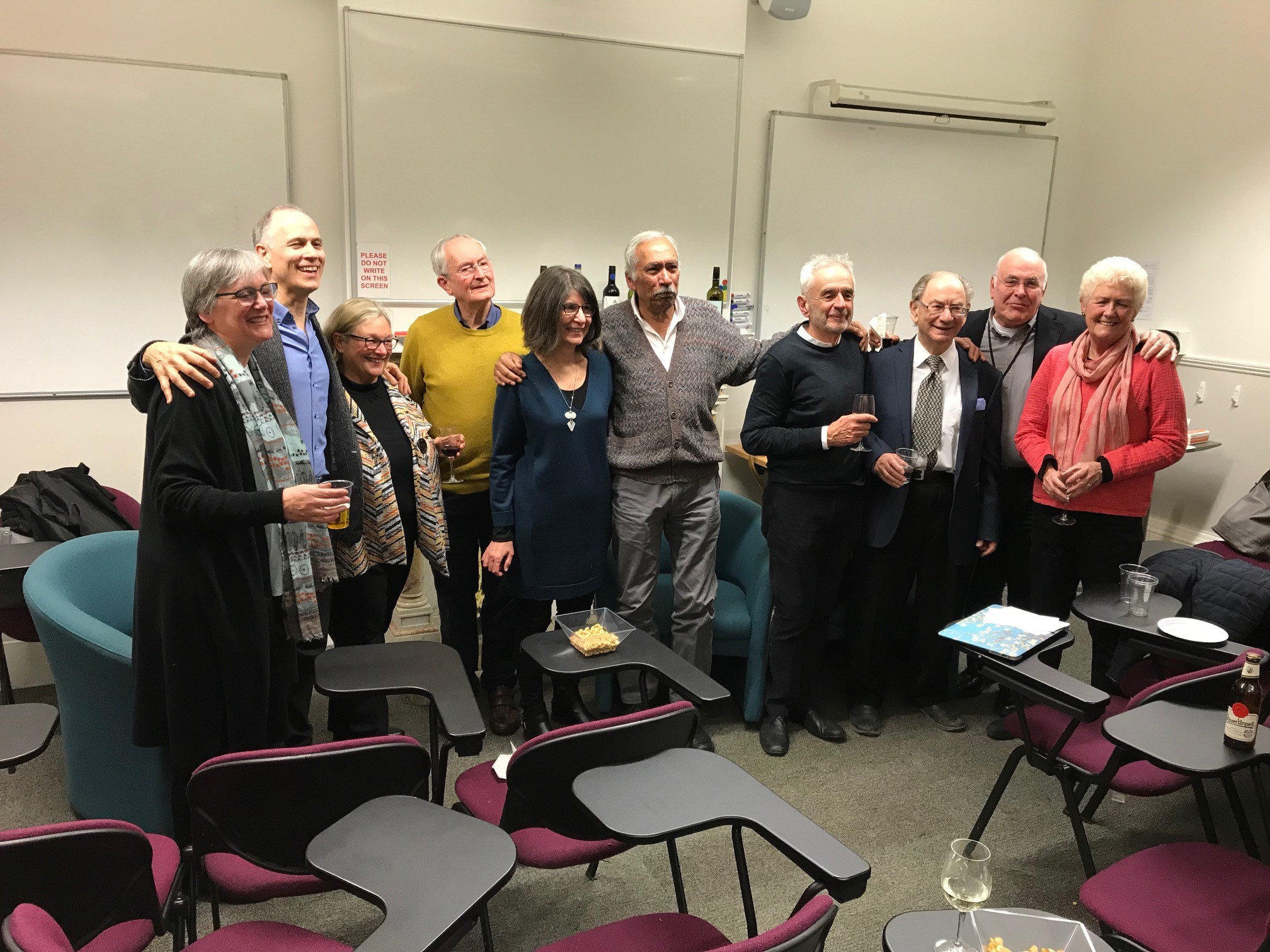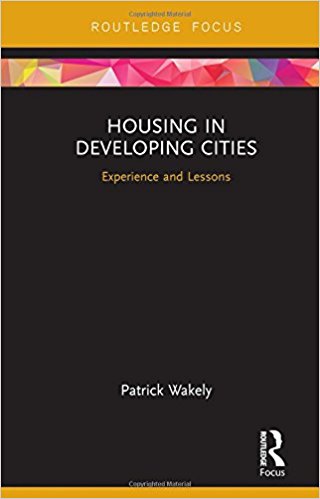
New Book (2019): 'Housing in Developing Cities: Experience and Lessons' (Patrick Wakely)
Submitted by frankie on Mon, 2018-04-16 17:08.
Wakely 2022
Members of DPU-Associates at event hosted by the DPU on 21 March 2018
to launch, ‘Housing in Developing Cities: Experience & Lessons’ by Patrick Wakely.
L-R: Caren Levy (DPU staff); Julio Dávila (DPU Director); Jo Beall; Pat Wakely;
Nadia Taher;
Babar Mumtaz; Robert Biel (DPU staff); Michael Safier; Harry Dimitriou; Caroline Moser.
CONTENT
Link to summary of the book
ENDORSEMENTS
Routledge
The views expressed in 'Recent News & Reflections' are those of the author and do not necessarily reflect those of any of the governments, organisations or agencies with whom they have been working.

|
Babar Mumtaz; Robert Biel (DPU staff); Michael Safier; Harry Dimitriou; Caroline Moser.

|
Universally, the production, maintenance and management of housing have been, and continue to be, market-based activities. Nevertheless, since the mid-twentieth century virtually all governments, socialist and liberal alike, have perceived the need to intervene in urban housing markets in support of low-income households who are denied access to established (private sector) housing markets by their lack of financial resources.
Housing in Developing Cities examines the range of strategic policy alternatives that have been employed by state housing agencies since the mid-twentieth Century. They range from public sector entry into the urban housing market through the direct construction of (‘conventional’) public housing that is let or transferred to low-income beneficiaries at sub-market rates, to the provision of financial supports (subsidies) and non-financial incentives to private sector producers and consumers of urban housing, and to the administration of (‘non-conventional’) programmes of social, technical and legislative supports that enable the production, maintenance and management of socially acceptable housing at prices and costs that are affordable to low-income urban households and communities. It concludes with a brief review of the direction that public housing policies have been taking at the start of the twenty first century and reflects on “where next”, making a distinction between ‘public housing’ and ‘social housing’ strategies and how they can be combined in a ‘partnership’ paradigm for the twenty first century.
1. Informal Housing procurement processes
Informal sub-division, sale, and development of vacant land; Invasions and squatting; Incremental development of informal settlements; Benefits and costs of informal urban housing processes.
2. Public sector intervention in low-income group housing
Conventional public housing in the public works tradition; Slum clearance; Organised (aided) self-help.
3. Enabling supports & ‘non-conventional’ housing strategies
Participation; Devolution; Enabling supports; Sites and services and informal settlement upgrading; Limits of the self-help and participation paradigm.
4. Three case studies of enabling support strategies
The Sri Lanka Million Houses Programme (MHP); Rio de Janeiro Favela Bairro Programme, Brazil; Oshakati Human Settlements Improvement programme, Namibia; Lessons from the case studies.
5. The return to ‘conventional’ public housing provision and incentives to private sector developers
6. Where next
City development strategies; Housing-need sub-group; Cultural integration and cosmopolitan development; Gender needs and assets; Climate change and geophysical hazards; Energy conservation and environmental sustainability.
7. Paradigm for the 21st Century
The case for incremental housing strategies; Rental housing.
8. Components of Support to Incremental Development
Land and location; Finance; infrastructure and services; Beneficiary election; Site planning; Building controls and supports; Community organisation and asset management; The private sector; Strategic planning
9. Some conclusions, capacity building and the way forward
"Patrick Wakely uses his unique understanding and vast experience to bring clear and practical solutions to the vexed challenge of housing in developing countries. Whereas most written policies typically benefit a small minority – the middle class and civil servants – Wakely’s approaches empowers the urban poor, both as users and producers of housing. This should be required reading for practitioners and policy makers alike." "Patrick Wakely’s new book is nothing short of the book that we all need in order to understand both how the huge growth in cities in the developing world is being managed, and how communities on extremely low incomes are getting by; providing their own housing with some public support and progressing their life chances. It is an invaluable guide to both the experience of housing in developing cities and the importance of recognising the potential of informal and semi-formal urban development, combined with a guiding public hand. I hope this book will help many people understand this dynamic process, as it will certainly help me." "This book is an excellent synopsis of fifty year's of practice in the provision of housing in developing countries. Patrick Wakely brings wide and thoughtful experience to this subject. The book focuses on 'the how' housing has actually been created and for whom. It is a needed counterpoint to the declaration of global goals which focus on the 'what'."
William Cobbett, Director, Cities Alliance, Brussels.
Anne Power, Professor of Social Policy and
Head, LSE Housing and Communities, London School of Economics and Political Science, London.
Michael Cohen, Professor of International Affairs, The New School, New York (Formerly: Senior Economist, World Bank, Urban Development Department, Washington DC).
Tom Carter, Independent urban management consultant, London
Taylor & Francis Group
New York and London
First published (hardback), 2018
Paperback, 2019; £14.99; US$24.95
eBook, from £7.50
https://www.routledge.com/products/9781138572089
subscriptions@tandf.co.uk